The Future of Social Media Regulation: Lessons from Lawsuits
- Last Updated: July 14th, 2025

Attorney Jessie Paluch, founder of TruLaw, has over 25 years of experience as a personal injury and mass tort attorney, and previously worked as an international tax attorney at Deloitte. Jessie collaborates with attorneys nationwide — enabling her to share reliable, up-to-date legal information with our readers.
Legally Reviewed
This article has been written and reviewed for legal accuracy and clarity by the team of writers and legal experts at TruLawsuit Info and is as accurate as possible. This content should not be taken as legal advice from an attorney. If you would like to learn more about our owner and experienced injury lawyer, Jessie Paluch, you can do so here.
Fact-Checked
TruLawsuit Info does everything possible to make sure the information in this article is up to date and accurate. If you need specific legal advice about your case, contact our team by using the chat on the bottom of this page. This article should not be taken as advice from an attorney.
Key Takeaways:
- Social media regulation addresses user protection while maintaining free speech and innovation.
- Legal challenges and public opinion are significantly influencing the regulation discourse.
- Legislators are exploring diverse approaches to create effective regulation frameworks.
Overview of Social Media Regulation
On this page, we’ll discuss the potential future of social media regulation, the lessons learned from the ongoing social media mental health lawsuits, the role of government in regulating social media platforms, and much more.
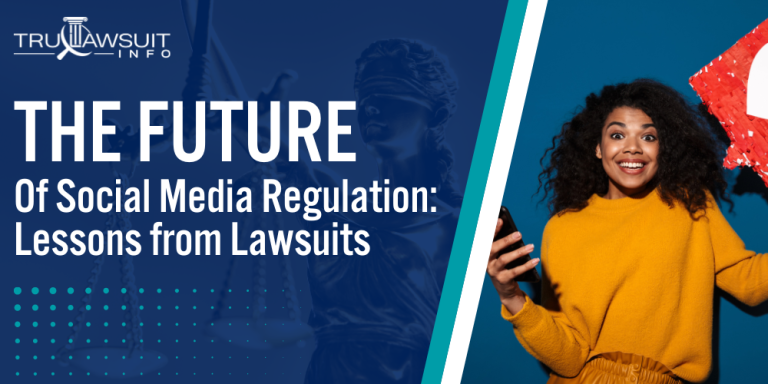
Intro to the Future of Social Media Regulation
The social media mental health lawsuits have exposed the need for increased regulation of social media platforms to protect user well-being and prevent the spread of harmful content.
Here are some key points about the future of social media regulation:
- The lawsuits have highlighted the importance of algorithmic transparency and accountability
- Regulators may require platforms to prioritize user well-being over engagement metrics
- Stricter age verification and parental controls may be implemented to protect younger users
If you or a loved one has suffered from mental health issues due to social media use, you may qualify to participate in the Social Media Mental Health Lawsuit.
Contact TruLawsuit Info for a free consultation using the chat on this page to receive an instant case evaluation.
Table of Contents
The Growing Debate Over Social Media Regulation
The discussion on how to regulate social media platforms has intensified, focusing on content moderation and the need for greater oversight to combat misinformation and hate speech.
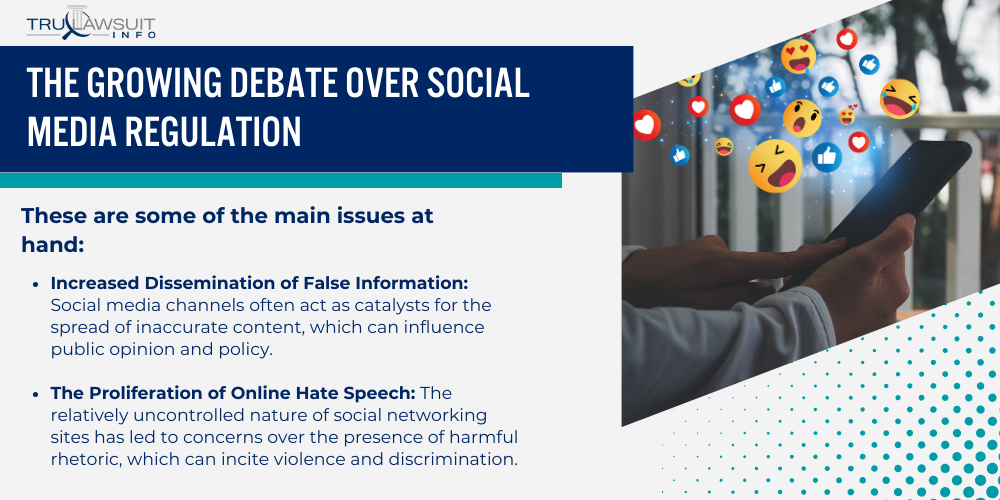
Concerns About Online Misinformation and Hate Speech
The prevalence of misinformation and hate speech on social media has prompted a reexamination of content moderation practices.
These are some of the main issues at hand:
- Increased Dissemination of False Information: Social media channels often act as catalysts for the spread of inaccurate content, which can influence public opinion and policy.
- The Proliferation of Online Hate Speech: The relatively uncontrolled nature of social networking sites has led to concerns over the presence of harmful rhetoric, which can incite violence and discrimination.
- Difficulty in Content Monitoring: The sheer volume of data generated by users presents a challenge for social media companies to effectively monitor and remove objectionable content.
- Impact on Civil Society: Misinformation and hate speech can undermine trust in institutions and erode the fabric of civil society, making it a matter of consumer protection.
Calls for Increased Transparency and Accountability
Calls to action include demands for data transparency and clearer accountability structures within social media companies.
Every point below adds weight to the debate:
- Better Transparency Measures: Advocates suggest that social platforms should disclose their content moderation policies and processes.
- Independent Auditing: Some propose that external entities should assess the effectiveness of content moderation systems.
- Regulatory Oversight: There’s a push for government oversight to ensure compliance with consumer protection standards and transparency commitments.
- Collaboration with Civil Society: Involving experts and organizations outside the tech industry is seen as vital to creating balanced and fair content regulation policies.
High-Profile Lawsuits Shaping Social Media Regulation
High-profile court cases continue to redefine the regulatory landscape of social media.
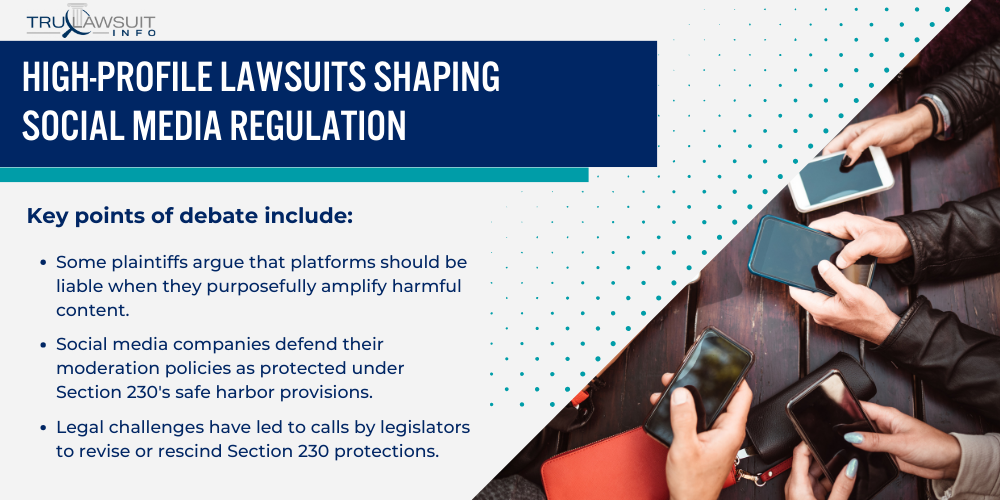
These cases often pivot on interpretations of existing laws like Section 230 and the application of antitrust principles.
Defamation Cases and the Limits of Section 230 Protections
Multiple federal court cases have focused on how Section 230 of the Communications Decency Act protects large social media platforms.
Section 230 protects internet platforms from liability for user-generated content, but its boundaries are being contested.
Key points of debate include:
- Some plaintiffs argue that platforms should be liable when they purposefully amplify harmful content.
- Social media companies defend their moderation policies as protected under Section 230’s safe harbor provisions.
- Legal challenges have led to calls by legislators to revise or rescind Section 230 protections.
- The outcomes of these cases may compel platforms to reassess their content policies and enforcement.
Antitrust Lawsuits Challenging Social Media Monopolies
Antitrust lawsuits address concerns about the concentrated power of major social media companies.
Here are some key aspects of these legal challenges:
- Accusations of anti-competitive practices have led to First Amendment scrutiny over how these platforms handle data, advertising, and user interaction.
- Cases often argue that monopolistic behavior stifles competition and innovation in the sector.
- The interplay between state laws and federal jurisdiction is critical in shaping the outcomes of antitrust legal battles.
- The Supreme Court may eventually weigh in, setting nationwide precedents that impact the future of social media regulation.
Proposed Legislative Solutions for Social Media Regulation
In response to growing concerns about the impact of social media, legislators are formulating targeted approaches to update regulatory frameworks governing online platforms.
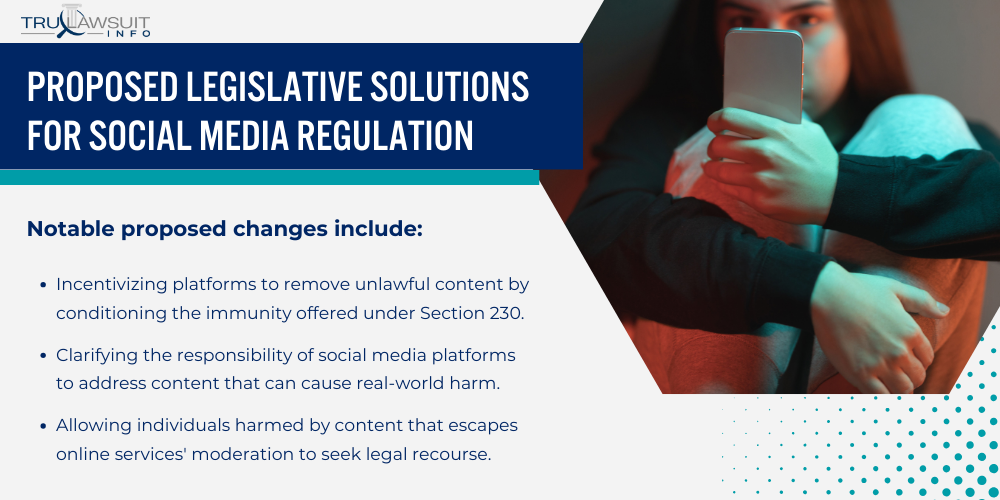
Amending Section 230 of the Communications Decency Act
Section 230 has long shielded social media companies from liability for user-generated content.
However, proposals aim to recalibrate this legal protection.
Notable proposed changes include:
- Incentivizing platforms to remove unlawful content by conditioning the immunity offered under Section 230.
- Clarifying the responsibility of social media platforms to address content that can cause real-world harm.
- Allowing individuals harmed by content that escapes online services‘ moderation to seek legal recourse.
- Mandating greater transparency from social media companies regarding content moderation practices and decisions.
Introducing New Laws to Address Specific Online Harms
Beyond revising existing legislation, new laws are explicitly proposed to tackle the digital age’s unique challenges.
Among these legislative efforts are:
- Requiring social media platforms to verify users’ ages to protect minors, as seen in the Protecting Kids on Social Media Act.
- Introducing features to mitigate social media addiction, based on bills like the Social Media NUDGE Act.
- Facilitating independent research on the impacts of social media by improving data access, highlighted in initiatives supported by Senator Coons.
- Addressing the high volume of users on major platforms through targeted regulations, as found in the Safe Social Media Act.
International Approaches to Social Media Regulation
Different regions around the world have taken distinctive stances on social media regulation, shaping the digital landscape in varying ways.
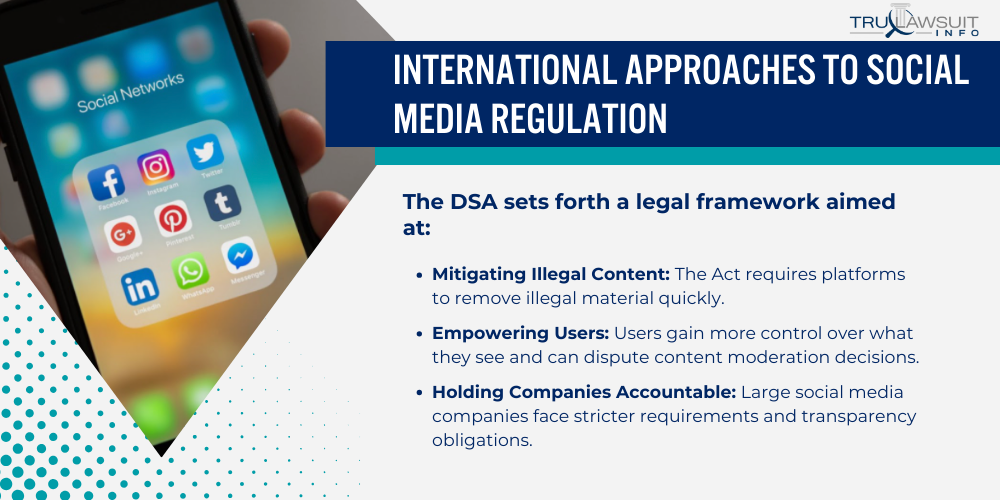
Key focuses include user protection, content moderation, and holding platforms accountable for on-site activities.
The European Union’s Digital Services Act
The European Union has moved towards establishing a more regulated digital environment with the introduction of the Digital Services Act (DSA).
The DSA sets forth a legal framework aimed at:
- Mitigating Illegal Content: The Act requires platforms to remove illegal material quickly.
- Empowering Users: Users gain more control over what they see and can dispute content moderation decisions.
- Holding Companies Accountable: Large social media companies face stricter requirements and transparency obligations.
- Enhancing Oversight: The EU intends to supervise large platforms directly to ensure compliance.
The DSA signifies a significant step in the EU’s efforts to regulate digital spaces, with particular emphasis on protecting users’ rights and ensuring a safer online community.
China’s Strict Control Over Social Media Platforms
In contrast to the EU’s approach, China maintains stringent control over its digital sphere, heavily regulating social media accounts and platforms.
This includes:
- Content Monitoring and Censorship: The government actively filters and censors inappropriate or politically sensitive content.
- Real-Name Registration: Users must link their social media accounts to their real identity, reducing anonymity online.
- Internet Platform Accountability: Social media outlets must comply with strict data and cybersecurity laws.
- Internet Sovereignty: China promotes the concept of “cyberspace sovereignty,” emphasizing its right to control the internet within its borders.
Balancing Free Speech and Public Safety in Social Media Regulation
Addressing the challenge of moderating content on social media requires careful consideration of First Amendment protections and public safety implications.
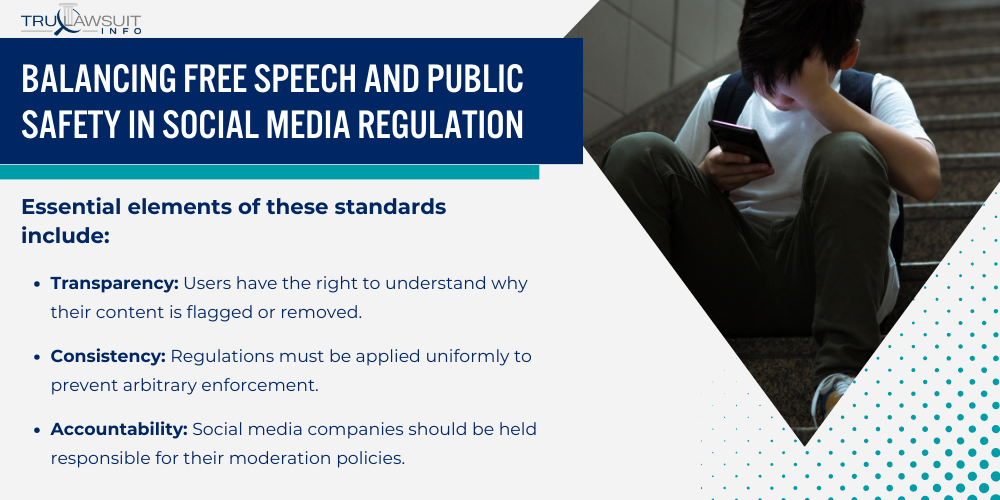
It is essential to regulate user-generated content without infringing on free speech rights and to ensure content moderation decisions are transparent and fair.
Defining Clear Standards for Content Moderation
Bold, clear standards are necessary for effective content moderation.
These guidelines should be a baseline for how social media algorithms and moderators assess content.
Essential elements of these standards include:
- Transparency: Users have the right to understand why their content is flagged or removed.
- Consistency: Regulations must be applied uniformly to prevent arbitrary enforcement.
- Accountability: Social media companies should be held responsible for their moderation policies.
- Appeal Process: Users should have the ability to challenge moderation decisions.
Protecting First Amendment Rights in the Digital Age
The First Amendment is a cornerstone of American democracy, ensuring free speech.
In digital spaces, these rights must be safeguarded carefully.
To protect free speech in the digital era, consider the following:
- Legal Precedents: Courts should provide clear guidelines on digital speech rights.
- User Rights: Social media users need clarity on their speech rights online.
- Neutral Policies: Social media sites must avoid ideological bias in moderation.
- Public Discourse: Platforms must facilitate a safe environment for diverse viewpoints.
Social media plays a critical role in public discourse.
These platforms are responsible for balancing the protection of First Amendment scrutiny rights and maintaining public safety through careful content moderation.
The Role of Self-Regulation in the Social Media Industry
In the social media industry, self-regulation represents a spectrum of voluntary efforts by companies to oversee and control the impact of their platforms on users and society.
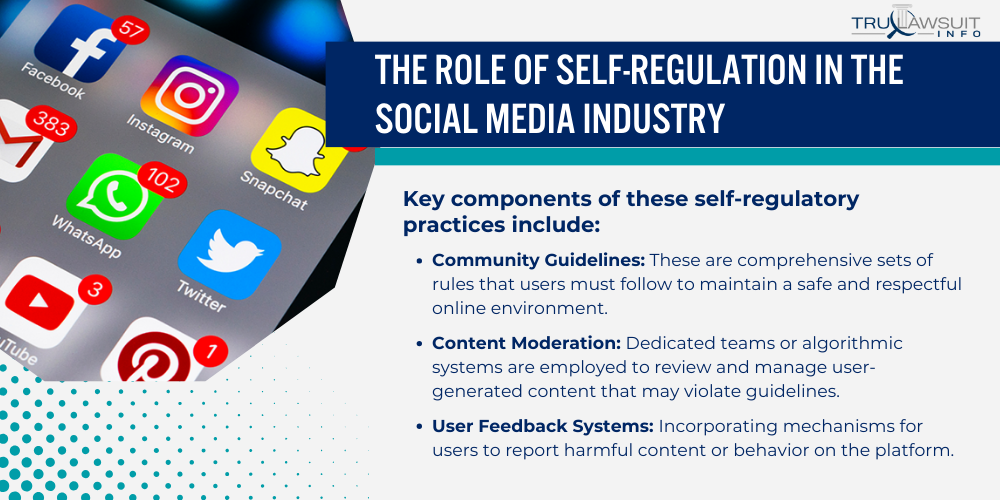
Voluntary Measures Taken by Social Media Companies
Social media companies have adopted various self-regulatory practices in an effort to balance user freedom with responsible governance.
Key components of these self-regulatory practices include:
- Community Guidelines: These are comprehensive sets of rules that users must follow to maintain a safe and respectful online environment.
- Content Moderation: Dedicated teams or algorithmic systems are employed to review and manage user-generated content that may violate guidelines.
- User Feedback Systems: Incorporating mechanisms for users to report harmful content or behavior on the platform.
- Transparency Reports: These reports are periodically released to inform the public about content removals, government requests, and enforcement actions.
Each of these methods underscores a commitment to creating transparent and accountable platforms.
Limitations and Criticisms of Self-Regulatory Efforts
Despite efforts by social media companies, critiques point out several shortcomings of self-regulation.
Common criticisms include:
- Enforcement Consistency: There’s a noticeable variance in how rules are applied to different users, leading to claims of biased content moderation.
- Lack of Clarity: The criteria for content removal can be vague, confusing users about what constitutes a violation.
- Effectiveness: Questions persist about whether self-regulation can effectively manage the sheer volume of content and complex social dynamics online.
- Transparency Requirements: Although companies provide reports, there is still a demand for deeper insights into the decision-making processes behind content regulations.
The effectiveness of self-regulatory practices remains an ongoing discussion, as social media users and regulators look for sustainable solutions.
Potential Unintended Consequences of Social Media Regulation
Regulating social media platforms can lead to unforeseen issues that might affect free speech, limit user access, disrupt business and innovation, and result in unintended forms of government censorship.
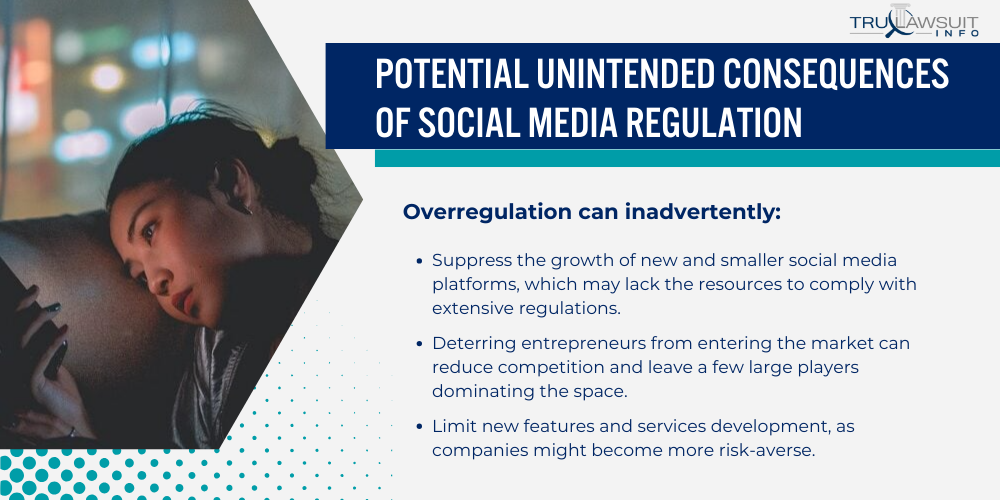
Risks of Overregulation Stifling Innovation and Competition
The balance between regulation and allowing innovation to flourish is delicate.
Overregulation can inadvertently:
- Suppress the growth of new and smaller social media platforms, which may lack the resources to comply with extensive regulations.
- Deterring entrepreneurs from entering the market can reduce competition and leave a few large players dominating the space.
- Limit new features and services development, as companies might become more risk-averse.
- Decrease the incentive for information technology advancements, potentially slowing the evolution of digital communication tools.
Business and innovation in the social media space are especially prone to being affected by aggressive regulatory approaches.
Concerns About Government Overreach and Censorship
Concerns about government overreach and censorship have been heightened with the push for more stringent regulation of social media platforms.
Many fear that without proper safeguards, these regulations could become tools for excessive control rather than protection instruments.
In attempts to regulate social media, there is a risk of enabling excessive government control, which could lead to:
- Imposing restrictions that could be interpreted as government censorship.
- Endangering the constitutional right to free speech under the guise of moderation.
- Limiting access to information is essential for a free and open society.
- Creating ambiguous regulations that can be misused to censor users based on political or controversial positions.
Precise and careful regulation crafting is crucial to avoiding encroaching on fundamental rights and liberties and mitigating the spread of misinformation and harmful content.
Lessons Learned from Social Media Regulation Lawsuits
In recent years, lawsuits concerning social media regulation have illuminated the challenges of addressing material harmful to society and the individual explanations necessary for understanding the impact of content.
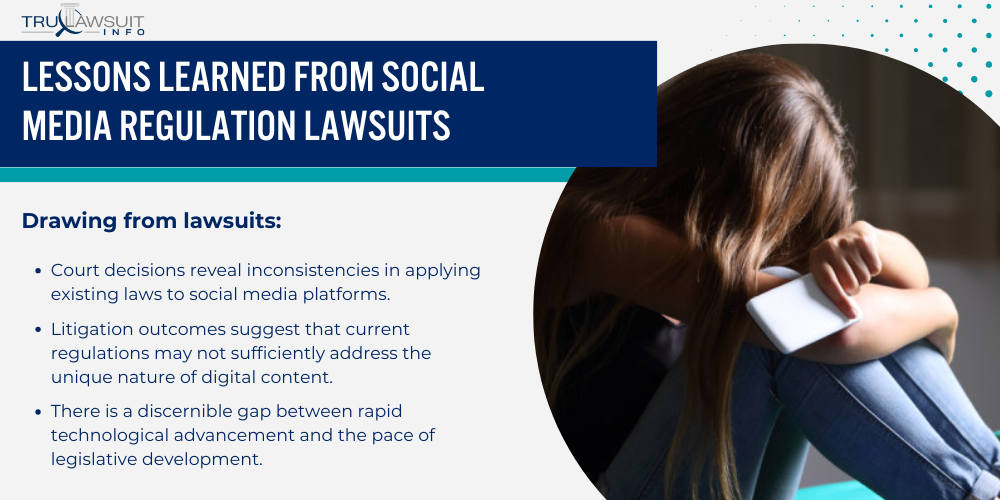
These cases underscore the importance of establishing clear legal frameworks and fostering robust collaboration between authorities and tech companies.
The Need for Clear and Consistent Legal Frameworks
Balancing freedom of speech with the need to curb harmful content represents a persistent challenge for legislators.
Drawing from lawsuits:
- Court decisions reveal inconsistencies in applying existing laws to social media platforms.
- Litigation outcomes suggest that current regulations may not sufficiently address the unique nature of digital content.
- There is a discernible gap between rapid technological advancement and the pace of legislative development.
- The involvement of entities like the National Science Foundation has been critical in providing data-driven insights, highlighting the need for evidence-based regulations.
This trajectory indicates a pressing requirement for comprehensive and adaptable legal frameworks.
Importance of Collaboration Between Policymakers and Industry
Effective regulation of social media isn’t a siloed endeavor; it requires coordinated efforts among all stakeholders.
Insights include:
- Success stories point to instances where policy and industry efforts have aligned to protect users while ensuring free speech.
- Collaboration ensures that laws reflect practical realities and technological capabilities.
- Dialogue amendment protects against overregulation that could stifle innovation or under-regulation that may fail to prevent harm.
- Ongoing communication helps craft clear explanations and guidelines to all parties involved, from social media company developers to end-users.
Across the board, cooperation has emerged as a key component in crafting effective and constructive regulation.
Charting a Path Forward for Effective Social Media Regulation
In this rapidly evolving digital age, determining the appropriate level of social media regulation is indispensable to ensure both the protection of individual users and the maintenance of a healthy digital marketplace.
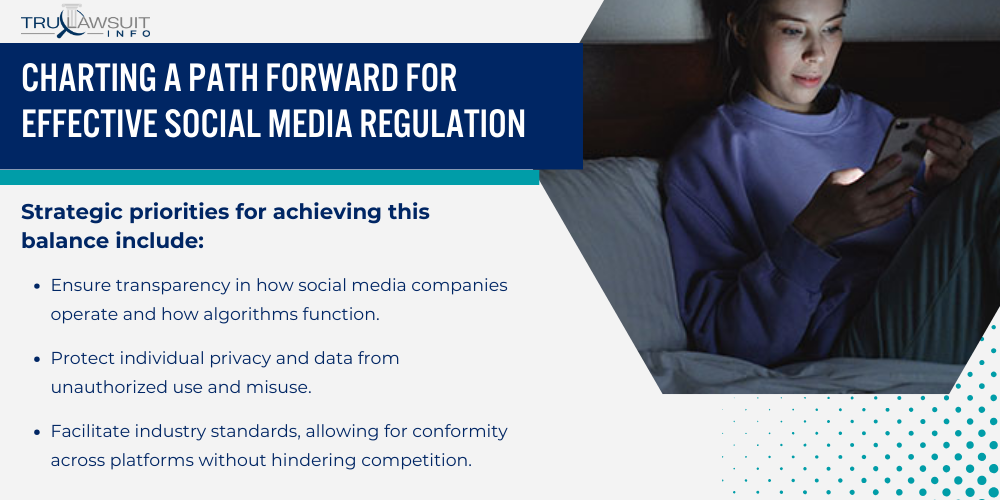
Striking a Balance Between Regulation and Free Market Solutions
Regulation of social media often aims to protect individual users against potential harm, yet it must not stifle innovation.
Policymakers face the challenge of delineating roles between government oversight and free market dynamics.
Strategic priorities for achieving this balance include:
- Ensure transparency in how social media companies operate and how algorithms function.
- Protect individual privacy and data from unauthorized use and misuse.
- Facilitate industry standards, allowing for conformity across platforms without hindering competition.
- Encourage self-regulation and best practices within the industry to complement legislative measures.
Fostering a culture of responsible social media use within society is integral.
Individuals and corporations need to collaborate for healthier internet engagement.
Fostering a Culture of Responsible Social Media Use
An essential part of social media regulation is cultivating an environment where individual users and platforms are mindful of their online behavior and its impact.
Key measures to encourage responsible use include:
- Promote digital literacy to empower users to navigate the online world securely.
- Develop resources for users to understand their rights and responsibilities on social media platforms.
- Incentivize platforms to create features that promote positive behavior among users.
- Establish clear community guidelines that are enforced consistently to maintain a respectful online space.
By implementing such practices, the path forward for effective social media regulation can lead to a harmonious balance where communication, innovation, and user protection coexist within the vibrant landscape of social media.
TruLawsuit Info: #1 in Social Media Platform Accountability
TruLawsuit Info has emerged as a leading advocate for accountability in the digital landscape.
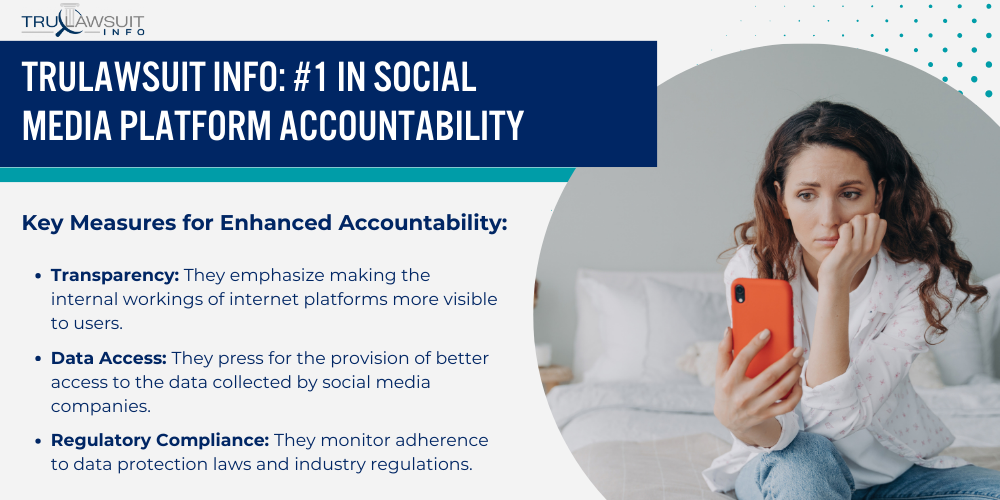
The organization highlights significant aspects of social media platforms and their data-handling practices.
Key Measures for Enhanced Accountability:
- Transparency: They emphasize making the internal workings of internet platforms more visible to users.
- Data Access: They press for the provision of better access to the data collected by social media companies.
- Regulatory Compliance: They monitor adherence to data protection laws and industry regulations.
- User Control: They advocate for stronger user control over personal information shared on social media.
The accountability of social media platforms is a pivotal element in protecting user data and ensuring ethical operations.
Here are further steps and considerations in the push for greater accountability:
- Social media platforms are responsible for safeguarding the data they accumulate from users.
- Effective accountability measures necessitate platforms to be forthright about their data practices.
- Policymakers are currently exploring legislation, like the Safe Social Media Act, which could transform how social media handles data.
- In certain regions, like Utah, laws such as Utah Legislature SB0089 specifically target the protection of minors on social media.
Frequently Asked Questions
-
What are the major debates surrounding the regulation of social media platforms?
Debates around social media regulation often focus on free speech versus misinformation control.
Another central discussion point is balancing individual privacy rights and public security concerns.
-
Can you provide examples of existing social media regulations?
Existing regulations include the General Data Protection Regulation (GDPR) in Europe, which upholds data privacy, and the Children’s Online Privacy Protection Act (COPPA) in the U.S., protecting children’s online activities.
-
How have social media regulations evolved in the year 2023?
In 2023, social media regulations saw an increased emphasis on user data control and measures to counteract deepfakes.
New policies also aimed to improve transparency regarding algorithmic decisions.
-
What are the key provisions of the Social Media Regulation Act?
The Social Media Regulation Act encompasses mandatory user account verification, disclosure requirements for political advertising, and strict penalties for failing to remove harmful content swiftly.
-
How does social media regulation vary across different states in the U.S.?
State-level regulation diverges significantly, with some states enforcing strict data privacy laws.
Others focus on consumer protection from manipulative social media advertising practices.
-
What recent bills have been proposed concerning the regulation of social media?
Recent legislative proposals include the Safe Social Media Act, aimed at safeguarding minors online.
There are also initiatives seeking to curb the spread of extremism and hate speech on platforms.

Experienced Attorney & Legal SaaS CEO
With over 25 years of legal experience, Jessie is an Illinois lawyer, a CPA, and a mother of three. She spent the first decade of her career working as an international tax attorney at Deloitte.
In 2009, Jessie co-founded her own law firm with her husband – which has scaled to over 30 employees since its conception.
In 2016, Jessie founded TruLaw, which allows her to collaborate with attorneys and legal experts across the United States on a daily basis. This hypervaluable network of experts is what enables her to share reliable legal information with her readers!
Have A Case?
Here, at Tru Lawsuit Info, we’re committed to helping victims get the justice they deserve.
To do this, we actively work to connect them with attorneys who are experts in litigating cases similar to theirs.
Would you like our help?
Tru Lawsuit Info is a reliable source of information about issues that may affect your health and safety, such as faulty products, data breaches, and environmental hazards.
Our team of experienced writers collaborates with medical professionals, lawyers, and advocates to produce informative articles, guides, and other resources that raise awareness of these topics.
Our thorough research provides consumers with access to reliable information and updates on lawsuits happening around the country. We also can connect consumers with attorneys if they need assistance.
Camp Lejeune's water contamination issue spanned several decades starting in the 1950s. Exposure to these chemicals has been linked to various serious health issues, including cancer, organ diseases, and death.
Research is increasingly suggesting a link between the use of Tylenol during pregnancy and the development of neurodevelopmental disorders, such as autism and ADHD, in infants.
Legal action is being taken against manufacturers of Aqueous Film-Forming Foam (AFFF), a chemical used in fighting fires. The plaintiffs allege that exposure to the foam caused health issues such as cancer, organ damage, and birth and fertility issues.
Have A Case?
Here, at Tru Lawsuit Info, we’re committed to helping victims get the justice they deserve.
To do this, we actively work to connect them with attorneys who are experts in litigating cases similar to theirs.
Would you like our help?







